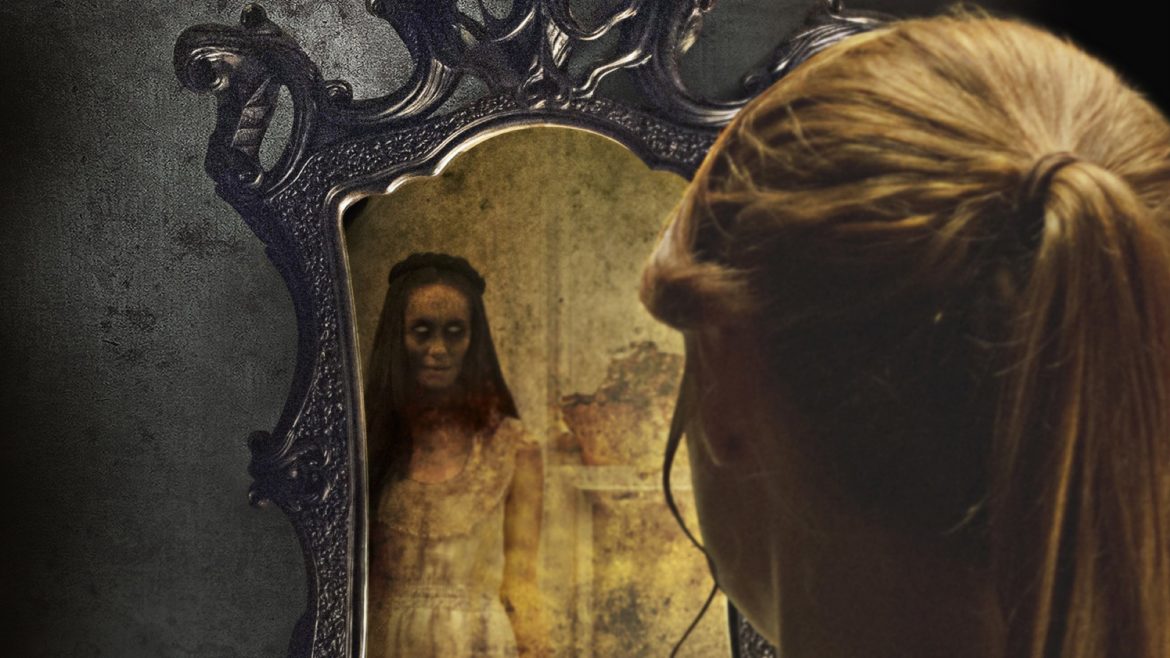Oculus is a horror movie about a killer mirror that kills people, with death.
It jumps back and forth between an adult brother and sister investigating it in the present day and their earlier childhood experiences with its misdeeds, when it terrorized their family. This is a thing killer mirrors often do, as I’m sure you’re aware. The mirror can’t be smashed, since it protects itself with something like a psychic forcefield, and it skews the perspectives of people in its vicinity, leading them to commit terrible crimes.
In an incredible achievement, Oculus is somehow not ridiculous – and even legitimately scary – for over an hour. Unfortunately, just past the halfway point, the film can’t escape the fact that it could’ve been titled Death Mirror – The Mirror That Deaths, and the whole thing falls apart. But it’s fun while it lasts.
We’re introduced to Tim Russell (the remarkably vacant Brendan Thwaites) as he exits a mental institution, where he’s spent the past decade plus. He’s made a lot of progress overcoming the minor childhood trauma of killing his dad, who killed his mom, and he’s ready to meet the world on his own terms. His sister Kaylie (Karen Gillan, better) is there to greet him.
Tim’s been through an awful lot, but he carries himself with an air of self-possession, thanks to his therapy and newfound self-knowledge. Kaylie, waiting for him with a mix of glee and self-assurance, appears to be in the corporate workforce, though it’s unclear what she does in her office. In any case, Oculus is uninterested in any of that – there are clearly other things afoot.
Kaylie seems manic and preoccupied from the start. We learn that she’s tracked down a particular mirror, and has had it shipped to an antiques warehouse. In the warehouse scene, she pulls the sheet off of it and stares it down like a nemesis; on cue, statues move behind her in its reflection.
Why would she acquire the very Death Mirror that killed her parents and got her brother locked up, especially on the day he got out? Good question! It turns out the two of them made a pact to destroy it when they were kids. And in the years since, Kaylie has also apparently become obsessed with the notion of demonstrating its evil, and thus exonerating her mom, dad, and brother, who only committed their terrible acts thanks to its influence.
They return, with the Death Mirror, to their childhood home, because of course that’s what you do. But this time, Kaylie has the entire space tricked out, and the movie sells her fanatical devotion to capturing the truth: there are cameras everywhere, multiple laptops collecting real-time information, a series of timers set to different phenomena she’s discovered in her extensive reading on the mirror’s history, even a fail-safe, in the form of barbell-weighted poking-thing (not the technical term) that can swing down from the ceiling and smash the mirror in case of emergency.
Kaylie breathlessly tells Tim (and us) that the mirror dates back centuries, and has left a staggering number of tragedies in its wake. In an initially interesting, increasingly grating fashion, Tim plays the part of the rational observer, as he’s learned in therapy. It’s not supernatural, there are explanations – Kaylie’s theories are attempts to displace responsibility and blame. Which is crazier – that their dad killed their mom, and Tim killed him, or that centuries of murder orchestrated by a Death Mirror led to that fateful day?
It’s a compelling point. It’s also incorrect.
The mirror eventually kicks into gear, and Flanagan cuts between the telling of their childhood story with their present circumstances. It’s occasionally effective. The mirror is tricky, so that allows the film to build jump and gross-out scares at its leisure, since it’s never clear what’s happening and what’s imagined/induced. (One scene of a character pulling broken glass out of their mouth stands out.)
But after a while, it gets tiresome to watch people to realize it was all a dream over and over, until it’s not. The film gets too obsessed with the childhood trauma subplot, and it closes exactly where you expect it will 40 minutes prior.
Which is too bad. Despite jump-scares being generally (and rightly) considered the laziest form of horror, there was a lot of mileage in the notion of forcing audiences to pay attention to reflections in a mirror. Oculus fits squarely in the Paranormal Activity mold as far as the narrative is concerned, but the self-consciousness implicit in focusing on a mirror seems like it could have been something more. In movies and series as different as Peeping Tom, The Blair Witch Project, Halloween, Candyman, or that one scene in Twin Peaks where Bob is glimpsed in the bottom of the frame, it’s scary when things you weren’t expecting pop up , and there’s a rich vein of horror to mine in the disconnect between how things appear and how they really are.
Oculus doesn’t reach that far in the end, opting instead for a melodrama that just happens to feature a murderous death mirror as one of its central characters.

